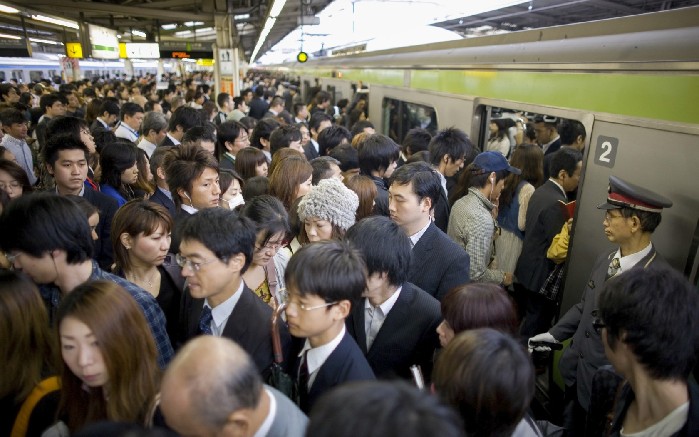(单词翻译:单击)
If you got the bus to work this morning rather than walking, don't feel guilty. A study suggests those who commute by bus or train are healthier than those who walk.
如果你今早不是走路而是坐公交上班的,不用觉得内疚。一项调查显示,乘坐公交和火车通勤的人比走路上班的人更健康。
It isn't clear why but it may be that when the walk to the bus or train station is factored in, those who take public transport are actually getting more exercise.
具体原因还不清楚,不过有可能是因为如果把走到公交或火车车站的路程也算在内,乘坐公共交通工具的人实际得到的锻炼更多。
The counterintuitive finding comes from a study of 6,000 Japanese adults who underwent a battery of health tests and provided information on their commute.
一项针对6000名日本成年人的研究得出了这一有违直觉的结论,这6000人参与了一系列健康测试并提供了有关自己通勤的各项信息。

Those who took the bus or train were deemed to be the fittest – they were the slimmest, had the best blood pressure and were the least likely to have diabetes.
那些乘坐公交或火车通勤的人被认为是最健康的——他们最苗条、血压状况最好并且最不容易得糖尿病。
Importantly, those who took public transport were 40 per cent less likely to be diabetic overall and 26 per cent less likely to be diabetic than the walkers. Those who walked or cycled were next healthiest, while those who drove to work were in the worst shape, the American Heart Association's Scientific Sessions meeting in Florida heard.
重要的是,坐公共交通通勤的人得糖尿病的概率比总体数据要低40%,比走路上班的人低26%。走路或骑车的上班族是第二健康的,自己开车上班的人身体最差。这一研究发现在佛罗里达举办的美国心脏协会科学会议(American Heart Association's Scientific Sessions)上发表。
A spokesman for the association said: 'While it's already established that a physically active lifestyle helps reduce the likelihood of diabetes, high blood pressure and obesity, it is unclear whether these risk factors for heart disease and stroke are affected by how you get to work.
该协会的发言人说:“尽管人们已经认可积极锻炼的生活方式有助于降低患糖尿病、高血压和肥胖症的可能性,但目前还不清楚这些引起心脏病和中风的风险因素是否受到上班的方式的影响。”
Study author Dr Hisako Tsuji, of the Moriguchi City Health Examination Centre in Osaka, said it was impossible to tell if taking public transport improves health or if bus and train passengers are simply healthier to begin with.
研究报告的作者、大阪(Osaka)守口市健康检测中心(Moriguchi City Health Examination Centre)的辻久子(Hisako Tsuji)博士说,本来想断定乘坐公共交通工具是否有利于健康或者公交和火车的乘客是否比其他人要健康是不可能的。
However, Japanese city-dwellers tend to only walk or bike to work if the journey will take under 20 minutes or so.
然而,日本城市居民在走路路程在20分钟以内的情况下,一般都会选择步行或者骑自行车上班。
As a result, when travel to and from station is taking into account, bus and train passengers may be walking and cycling further than those who walk or bike their entire journey.
因此,如果计入往返站点的路程,那些乘坐公交或火车的人走路或骑车的距离可能比全程都走路的人要长。
Dr Tsuji said: 'Active modes of commuting to work may be important physical activity in countries where lifestyles have become sedentary.
辻久子博士说:“在人们习惯久坐不动的生活方式的国家,活跃的通勤工作模式可能成为重要的身体活动。”
'People should consider taking public transportation instead of a car, as a part of daily, regular exercise.
“人们应考虑乘坐公共交通工具而不是自己驾车,作为日常规律锻炼的一种形式。”
'It may be useful for healthcare providers to ask patients about how they commute.'
“对医疗服务提供者来说,询问病人他们的通勤方式也许能提供有用的信息。”
Dr Jorge Plutzky, of the American Heart Association, cautioned against reading too much into the results. But he added that the study throws up the idea that 'activity, even when modest and integrated into one's lifestyle like how you get to work, and the walking before and after you're getting there, could matter'.
美国心脏协会的乔治·普卢茨基(Jorge Plutzky)博士提醒人们不要对研究结果作太多解读。但他补充道,这项研究提出了新的理念,那就是“即使是不太剧烈、融入个人生活方式之中的运动,比如上班的方式以及上下班途中的步行,也会起作用。”


